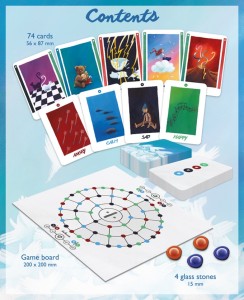I have recently picked up a number of games that seem light when you look at them on the table, but hold a great deal of value in the play experience. The two that most typify this would be The Grizzled and And Then We Held Hands. These games have next to nothing in common mechanically. One is a game for up to five players set in the trenches of World War I and the other is a two player game about a couple that is fighting and struggling to communicate in a struggling relationship. There is a thread that runs through both of these experiences though, asking you to pick it up and follow where it leads you. It is part of what makes gaming as ministry different than any other game experience.
 I first saw this one night around my dining room table. My wife and I had a friend over who was interested in playing the Grizzled with us. She is a high school English teacher who teaches a class on war literature. After hearing me talk about the game’s ability to effectively transport players into the mind of soldiers struggling to keep it together, she wondered if it might be something worth bringing out to play with her students. Still fresh from Gen Con, I was excited to get it back to the table. I explained the rules, dealt the cards, and started down road to peace together.
I first saw this one night around my dining room table. My wife and I had a friend over who was interested in playing the Grizzled with us. She is a high school English teacher who teaches a class on war literature. After hearing me talk about the game’s ability to effectively transport players into the mind of soldiers struggling to keep it together, she wondered if it might be something worth bringing out to play with her students. Still fresh from Gen Con, I was excited to get it back to the table. I explained the rules, dealt the cards, and started down road to peace together.
During the course of the game, she pulled the “Christmas Day” card and practically teared up she was so happy for the reprieve from the pain and trauma her soldier had endured. Yes, I thought, She’s getting it. She’s starting to feel it! However, that peace was short lived. A heavy silence hung in the air when we realized that peace was not in our future, but, after that passed, there were smiles all around. It was a good game.
As I packed the game away, I asked her whether she still planned on playing it with her students. “Yeah,” she said apprehensively, “I think so. I guess I just wonder what stops somebody from just playing cards and not thinking about the deeper meaning?”
It’s a fair question. The answer is ‘nothing.’ Just like any other medium, there is nothing that requires a person make an effort to search through the meaning of their thoughts and actions. Nothing that forces them to have any more than a surface experience. You can just play your cards, end your turn, and shrug it off when it’s done. I told her as much, but I didn’t leave it there. The game may not make them ask the questions they needed to – but she could.
 Similarly, when I told my wife that And Then We Held Hands was a game about a couple dealing with a struggling relationship and trying to learn how to communicate with each other, she was willing to give it a shot. Players are not allowed to talk strategy in this game. There is actually a variant where players are not allowed to talk at all – relying entirely on watching the moves the other player is making and responding in kind. You use cards from both your hand and the other player’s hand to move across spaces on concentric circles. Blue and green spaces represent positive emotions. Black and red spaces are negative. You can use as many cards as you’d like on your turn, but you will only get new cards to replace them if you are emotionally balanced.
Similarly, when I told my wife that And Then We Held Hands was a game about a couple dealing with a struggling relationship and trying to learn how to communicate with each other, she was willing to give it a shot. Players are not allowed to talk strategy in this game. There is actually a variant where players are not allowed to talk at all – relying entirely on watching the moves the other player is making and responding in kind. You use cards from both your hand and the other player’s hand to move across spaces on concentric circles. Blue and green spaces represent positive emotions. Black and red spaces are negative. You can use as many cards as you’d like on your turn, but you will only get new cards to replace them if you are emotionally balanced.
 Like The Grizzled, the gameplay itself isn’t complicated and can be done without any thought of what’s happening. Pull cards, move your piece, try to balance accomplishing goals while leaving yourself options for future moves. The game will not make its players ask questions like “How do you think she felt when you took from her? Did you notice that she was emotionally drained and had nothing left to give you?” There is nothing that will point out that the resolution for the optional ‘argument’ cards requires the players to occupy the same space on the board – signifying that in order to move forward, you need to start on the same page. A personal may or may not come to that place on their own. Yet, either way, they can be helped to see what is there in front of them.
Like The Grizzled, the gameplay itself isn’t complicated and can be done without any thought of what’s happening. Pull cards, move your piece, try to balance accomplishing goals while leaving yourself options for future moves. The game will not make its players ask questions like “How do you think she felt when you took from her? Did you notice that she was emotionally drained and had nothing left to give you?” There is nothing that will point out that the resolution for the optional ‘argument’ cards requires the players to occupy the same space on the board – signifying that in order to move forward, you need to start on the same page. A personal may or may not come to that place on their own. Yet, either way, they can be helped to see what is there in front of them.
There is a time and place to just let the game speak for itself. It’s valid to just let the game happen, for example, when the act of playing together itself is the goal. Maybe the players are dealing with a lot of pressure in their daily lives, and they are just looking to unwind with friends. Plumbing the depths of emotional weight may very well ruin that.
But if you gather people together around the table looking to explore what the themes and/or mechanics are trying to say, make sure that you plan a debrief. Be intentional about setting aside time to ask the questions the game is asking and put yourself in the place it wants to bring you to. When you do, there are certain things to keep in mind.
- Show – don’t tell. The old storytelling tip works just as well here. You can just TELL people what to think and what a thing means, but then they’re just enduring a lecture. Ask questions that get people thinking about it, but let them think it through.
- Don’t force it. Games will often be designed for an experience. It’s clear that they want to the player to think or feel a certain way because of the theme. Look to facilitate that with the players rather than tacking on a ‘teaching moment’ to a game that’s just trying to be silly.
- If you are having a meaningful moment with a game – share that in your debrief. If a game’s components or theme cause you to think, you may not be the only one. Even if it isn’t directly expressed in the design, moments like that can provide great bonding moments between players.





The best games are those that keep you pondering and talking about the game experience long after the play ended. Games that are emotionally impacting, thought provoking, or just tear inducing hilarity create shared memories that bond us together as we reflect on that moment. Debriefs and conversations afterwards help us strengthen those memorable experiences by sharing how we personally were impacted.